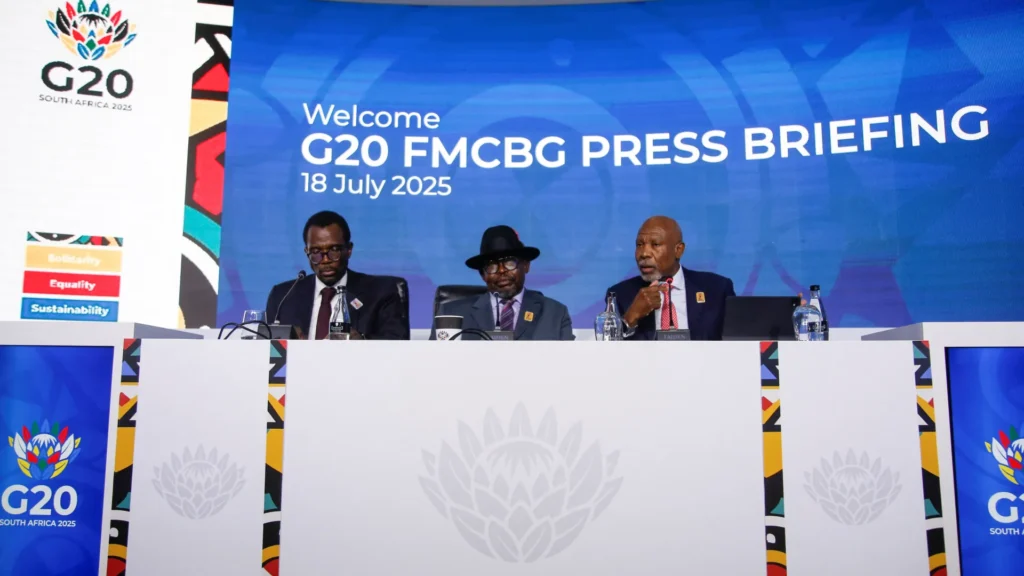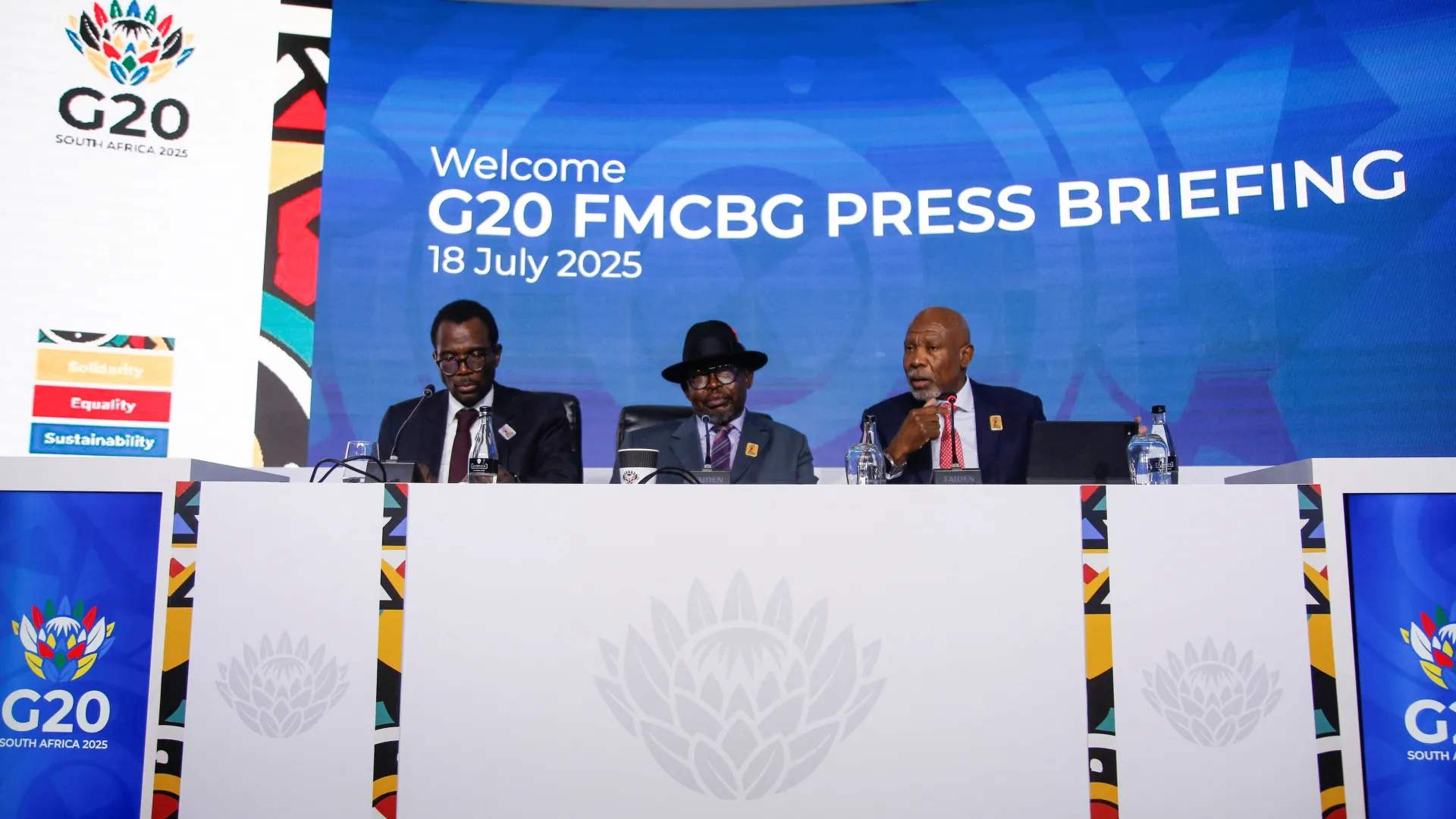Get a detailed breakdown of the key discussions at the 2025 G20 Finance Ministers’ meeting—debt restructuring, trade tensions, and climate financing dominate global priorities.

The G20 Finance Ministers and Central Bank Governors’ Meeting held in Cape Town, South Africa, in July 2025 came at a critical time for the global economy. Amid rising debt pressures, fractured trade relations, and a growing urgency to address climate change, the world’s top financial leaders gathered to seek solutions for the most pressing economic challenges.
From debt restructuring in Africa to the evolution of climate finance, the summit’s discussions signal where global cooperation is heading—and where it’s falling short. Here’s a complete breakdown of what happened and what it means for economies and investors around the world.
💸 Debt Relief: A Renewed Global Priority
One of the major themes at this year’s summit was the sovereign debt crisis plaguing low- and middle-income countries, particularly in Africa and Latin America. More than 60 nations are now facing debt distress, with limited access to refinancing options.
Finance ministers acknowledged the shortcomings of existing frameworks like the G20 Common Framework for Debt Treatment, which has seen little success since its launch in 2020. Discussions focused on:
- Streamlining debt restructuring timelines
- Involving private creditors in restructuring agreements
- Creating a transparent global registry of sovereign debt
South African officials pushed for greater support for countries unable to service loans tied to infrastructure and climate projects, urging G20 nations to rethink the role of multilateral banks and credit rating agencies.
🌐 Trade Tensions in Focus
Trade remained a high-stakes issue, especially in the wake of new U.S. tariffs on Chinese tech and EV exports, which have rattled global markets. Several emerging economies expressed concern over escalating trade wars, which are beginning to impact:
- Export-dependent developing economies
- Cross-border supply chains for critical goods
- Foreign direct investment (FDI) into high-risk regions
Calls for a reformed World Trade Organization (WTO) echoed through the summit halls, with many leaders pushing for more inclusive trade frameworks that support fair digital and green trade.
India and Brazil emphasized the need for climate-conscious trade agreements, while Germany and Canada pressed for carbon border adjustment mechanisms to avoid economic leakage.
🌱 Climate Finance: Urgent, But Fragmented
The urgency of climate finance dominated multiple sessions, particularly around adaptation funding, loss and damage compensation, and the role of private capital in green initiatives.
Highlights include:
- Renewed commitments to the $100 billion climate finance target, originally promised in the Paris Agreement
- Proposals for climate-linked debt swaps to reduce burdens on climate-vulnerable countries
- Pledges to fund green infrastructure through blended finance (public-private partnerships)
However, challenges persist:
- Some developed countries, including the U.S., withdrew from certain transition partnerships, creating uncertainty for developing nations counting on support
- The lack of standardized ESG reporting and green bond certifications continues to limit investor confidence
Despite this, progress was made in mobilizing climate risk data-sharing frameworks and advancing climate stress-testing in central banks.
🏦 Digital Finance & Regulation
Another forward-looking discussion revolved around digital currencies, stablecoins, and cross-border digital payments. With several countries piloting central bank digital currencies (CBDCs), the summit addressed:
- Regulatory harmonization for digital asset exchanges
- Preventing money laundering and illicit flows through digital tokens
- The role of AI in financial surveillance and auditing
G20 members agreed on the need for coordinated regulation of digital finance to ensure innovation does not outpace oversight.
🧭 South Africa’s Role as Host
As host country, South Africa emphasized inclusive development, bridging the North-South finance gap, and investing in human capital. The nation used its platform to spotlight:
- The need for regional infrastructure investment in Africa
- Better access to IMF Special Drawing Rights (SDRs) for developing nations
- Incentives for youth entrepreneurship and digital upskilling
South Africa’s Finance Minister urged fellow nations to remember that “global growth cannot be sustained without equity and justice in capital access.”
📊 Key Outcomes from the G20 Finance Summit 2025
- Global debt task force formed to propose reforms by early 2026
- $30 billion in new green investment pledges from G20 development banks
- Joint digital finance principles endorsed by all member nations
- Renewed call to WTO for inclusive trade rules
💬 Final Thoughts
The 2025 G20 Finance Ministers’ Meeting showed that while consensus is still fragile, there is growing recognition that the world’s economic problems are interconnected. Debt restructuring, fair trade, and climate financing can no longer be solved in silos.
For investors, financial institutions, and policymakers, these outcomes will shape the next year of economic policy and market direction. The real test will be implementation—how quickly words become actions, and promises turn into tangible impact on people’s lives.
In an increasingly divided world, finance might be the one area where global cooperation still has a fighting chance.

